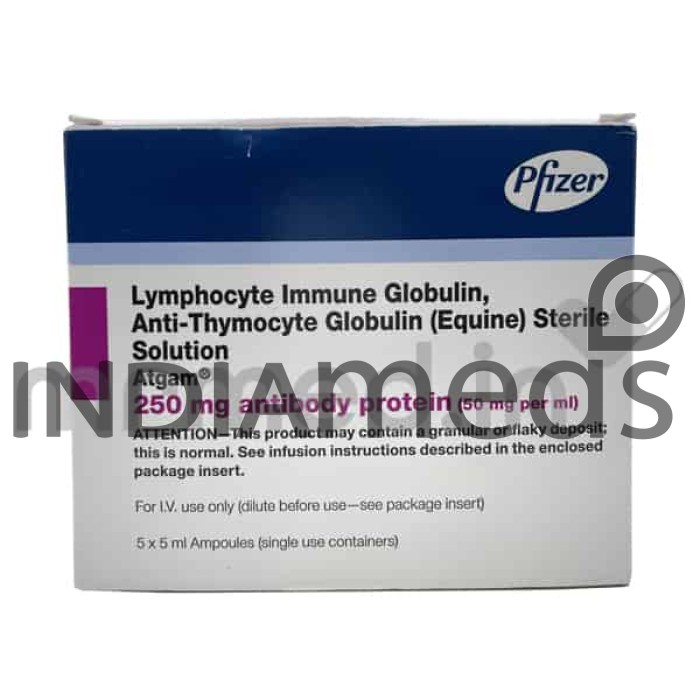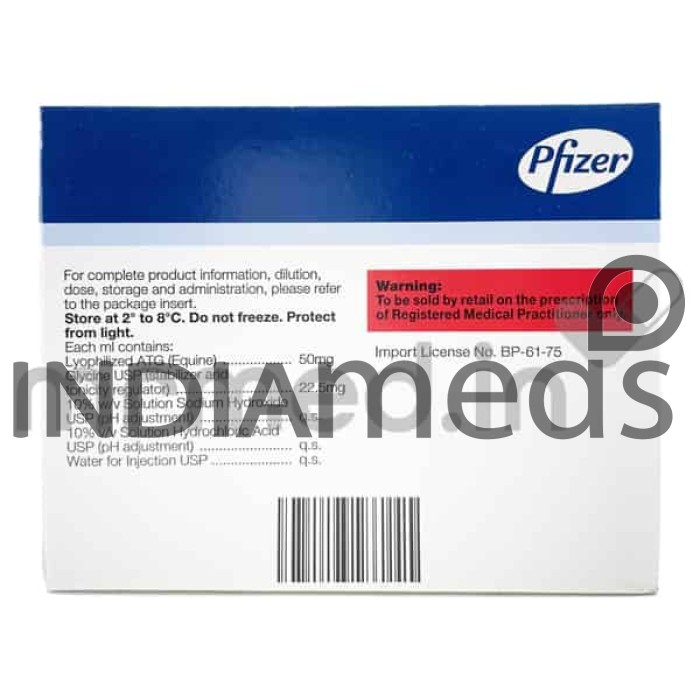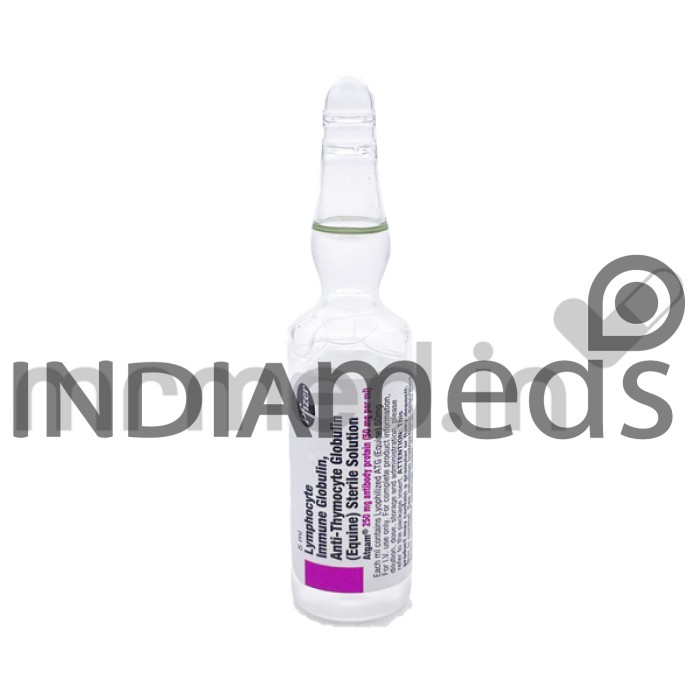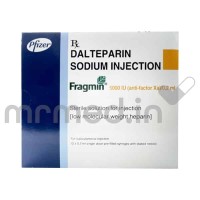Atgam 250mg Injection contains the active ingredient Antithymocyte Immunoglobulins. It is a purified and sterile form of gamma globulin. It is isolated from the hyperimmune plasma of horses immunized with human white blood cell components. It is used after kidney transplantation and other therapies to treat and delay organ rejection. After solid organ transplantation, the body generates an aggressive immune response because it recognizes the transplanted organ's antigens as a foreign antigen. Thus, treatment with immunosuppressive agents is necessary after an organ transplant to prevent organ rejection.
Aplastic anemia is a condition characterized by the failure of the bone marrow to produce sufficient blood cells. Atgam 250mg Injections are used to treat severe aplastic anemia, suppress the immune system, and reduce the immune-mediated destruction of bone marrow cells. This helps to restore normal blood cell production. Atgam 250mg Injection can decrease the need for high doses and prolonged use of corticosteroids in immunosuppressive treatments, minimizing side effects and risks. Individuals with known hypersensitivity or previous severe allergic reactions to Atgam 250mg Injection or any of their components should not receive it. Live vaccines should generally be avoided during treatment. Individuals with active infections, particularly severe or systemic infections, should only receive until the infection is adequately treated and resolved.
Therapeutic Effects of Atgam 250mg Injection
Additionally, these are used in treating conditions such as aplastic anemia and graft-versus-host disease (GVHD), where the immune system attacks the body's cells or tissues. Modulating the immune response reduces immune-mediated damage, alleviates symptoms, and promotes the restoration of normal cell production.
Pregnancy
If you are taking Atgam 250mg Injection and are planning to become pregnant or are already pregnant, it is important to discuss this with your healthcare professional.
Breast Feeding
If you are breastfeeding and require Atgam 250mg Injection treatment, discussing your specific circumstances with your healthcare provider is crucial.
Lungs
It is unknown whether Atgam 250mg Injection can be administered in patients with lung diseases. Inform your physician if you have any lung diseases before initiating the therapy.
Liver
Atgam 250mg Injection should be used cautiously in individuals with liver impairment or pre-existing liver disease. This is because this medication is primarily metabolized in the liver, and impaired liver function can affect the metabolism and clearance of the medication from the body.
Alcohol
It is unsafe to drink alcohol while taking Atgam 250mg Injection. It may reduce the drug's effectiveness and can cause toxic side effects.
Driving
Atgam 250mg Injection can cause dizziness. It is recommended to avoid driving and operating heavy machinery during the treatment.
Serious
- Allergic reactions
- Infections
- Blood disorders (anemia, thrombocytopenia)
- Kidney dysfunction
- Neurological complications
Common
- Urinary tract infection
- Stomach pain
- High BP
- Nausea
- Fever, headache, and chills
- Anxiety
- Skin reactions
It is important to follow proper hygiene practices to reduce the risk of infections, such as frequent handwashing and avoiding close contact with contagious individuals. Inform your healthcare provider about any signs of infection, such as fever, cough, or sore throat, for prompt evaluation and appropriate treatment.
While Atgam 250mg Injection can potentially cause kidney or liver dysfunction, the risk of long-term damage is generally low. However, regular monitoring of kidney and liver function is important during the treatment to detect any early signs of impairment. Report any significant changes in urinary output or jaundice (yellowing of the skin or eyes) to your healthcare provider.
Infusion-related reactions, such as fever and chills, can occur during Atgam 250mg Injection administration. Slowing down the infusion rate, pre-medicating with antihistamines or corticosteroids, or using other supportive measures as your healthcare provider recommends can help minimize these reactions.
Prolonged use of immunosuppressive agents, including Atgam 250mg Injection, may be associated with a slightly increased risk of developing certain malignancies. However, the overall risk is generally low. As your healthcare provider recommends, regular monitoring and screening for malignancies can help detect any potential issues early.
While CMV reactivation is a known risk with Atgam 250mg Injection therapy, there may also be an increased susceptibility to other viral infections. It is important to discuss any specific concerns or symptoms with your healthcare provider, who can evaluate the risk and provide appropriate guidance.
Monitoring kidney function, liver function, blood counts, and viral markers may be necessary during Atgam 250mg Injection treatment. Your healthcare provider will determine the appropriate monitoring schedule based on your condition and treatment plan.
| Molecule name: Antithymocyte Immunoglobulins | Therapeutic class: Immunosuppressants |
| Pharmacological class: Immunosuppressant agents. | Indications: 1. Organ Transplantation (prevention of organ rejection) 2. Aplastic Anemia 3. Renal Allograft Rejection (kidney rejection) 4. Autoimmune Hemolytic Anemia (type of blood disorder) 5. Myasthenia Gravis (bone disorder) |










